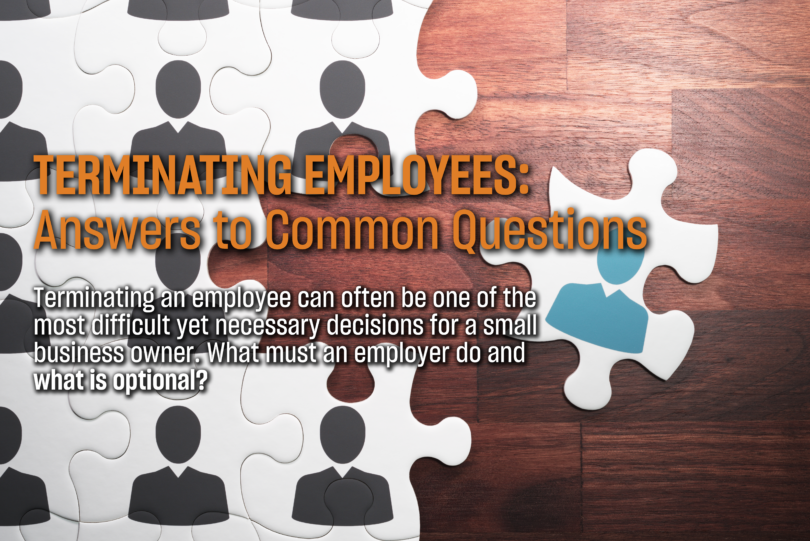Terminating an employee can often be one of the most difficult yet necessary decisions for a small business owner. What must an employer do and what is optional?
Terminating an employee can often be one of the most difficult yet necessary decisions for a small business owner. Business needs change. Issues arise. You, the employer, must do what’s best for your clients, your other employees, and ultimately, your business. However, the situational pressure of having to fire someone can cause many employers to overlook some of the legalities associated with termination. This article provides some guidance on how to terminate an employment relationship while avoiding the common pitfalls (and big penalties) of California’s Labor Code.
As you may now, California is an “at-will” employment state, meaning employers have the right to terminate an employee, with or without notice, with or without cause, for any reason, so long as that reason is not unlawful. Of course, the list of unlawful reasons is long—discrimination, retaliation, and implied-in-fact contracts being the most typical (and topics for another article). Regardless, once you’ve come to your decision to terminate, take heed of some common problems that employers encounter.
MUST
Pay Them Immediately Upon Termination
The situation goes like this: an employer decides to fire an employee, either for reasons that have built up over time or for a sudden incident that warrants immediate firing. While at work, the boss informs the employee that he is fired and sends the employee home. A couple days later or, even worse, the next pay period, the employer processes payroll and sends the paycheck to the fired employee. Now, what seems like standard procedure has created big liability for the employer.
California Labor Code § 201 reads: “If an employer discharges an employee, wages … are due and payable immediately.” Yes, immediately—meaning at the moment of termination (not even direct deposit the next day). Under this code section, the situation above is clearly unlawful, exposing the employer to liability for unpaid wages and severe waiting time penalties. Waiting time penalties accrue every day that the employee has not been paid in full, at the rate of the employee’s daily pay, up to 30 days and until payment made in full. (See Labor Code § 203.)
To illustrate, if you fire your employee who makes $160 per day, and you fail to pay him for two weeks after termination, you are looking at $2,240 ($160 x 14 days) in waiting time penalties (on top of earned wages). More, a lawsuit or administrative action brought to collect these wages may entitle the employee to reasonable attorney’s fees. Thousands upon thousands of dollars are at risk for a potentially innocent mistake of untimely processing a fired employee’s final payment. Given that terminated employees do not always leave on the best of terms, don’t be surprised when you receive an attorney demand letter claiming these exorbitant penalties and more.
What if They Quit?
The same issue arises when an employee quits, although the employer has a little more time. An employer has 72 hours (3 calendar days) to pay an employee who quits or, if the employee gives more than 72 hours’ notice, on that employee’s last day of work. (See Labor Code §§ 202, 208.) Failure to timely pay exposes the employer to the same penalties and fees above.
The practical advice: if you make a decision to fire an employee, make sure their paycheck is cut and ready on the very day that the employee will be let go. Of course, ensure that the final paycheck includes all wages earned to date of termination, including any accrued vacation time or PTO. Because the law provides payment must be made “at the place of discharge” (see Labor Code § 208), the best practice is to hand the employee the check at the premises, before the employee leaves. Mailing checks can be problematic. Under the law, payment is not made until it is delivered or tendered. If, for instance, a check is mailed without the consent of the employee, an employer can be exposed to a wage claim if that employee simply says that they never received it.
OPTIONAL—BUT SHOULD
Terminate at the End of the Work Day
If possible, terminate the employee at the end of the work day. Do not have the employee report to work and then immediately send them home. Employers can be liable for “reporting time pay”—when an employee shows up for work and is sent home before at least half of the scheduled day’s work. (See Cal. Code Regs., tit. 8, § 11040, subd. 5(A).) For example, if an employee is scheduled for an eight-hour shift and is sent home immediately, the employer must pay that employee at least half a day’s work, or four hours. Failure to pay this “reporting time pay” exposes employers to claims for unpaid wages with similar penalties above.
Note that no deductions may be made from an employees’ final payroll other than taxes or those which are pre-authorized, such as regular health care premiums. It is illegal to deduct funds for failure to return company property or for a loan that is not yet repaid. If an employer needs to collect from a former employee, the employer’s remedy is in Small Claims Court.
MUST
Give Them Info on Insurance and Retirement Plans
Finally, the former employee must be given an EDD notice as to their rights for Unemployment Insurance, continuation of any employer health care under COBRA (or Cal-COBRA), and also any company sponsored retirement plans.
OPTIONAL
Tell Them Why They Are Being Terminated
A common question of employers on this topic: “Should I tell my employee the reason for termination?” This is a judgment call. Employers have no obligation under the law to disclose why an employee has been fired. But for practical reasons, informing the employee of the legitimate reason for firing may mitigate conflict and hard feelings later. If you feel the need to put a reason for termination in writing, always be truthful but write in general language that cannot be twisted later by a clever attorney. Ideally, any bona fide reasons for firing would be well-documented in the employee’s personnel file to defend against any wrongful termination claim later.
OPTIONAL
Paying a Severance
Another question often asked by employers: “Do I have to pay severance?” Again, employers have no obligation to pay an employee severance, although many do as a showing of good faith, especially for long-term employees. If you do decide to give the employee a severance package, make sure it is not without a thorough, attorney-drafted severance agreement that releases future employment claims against the employer. The law prescribes many rules and requirements of these severance agreements, so ensuring compliance is essential to make sure your severance agreement is enforceable.
This article only scratches the surface of some of the many pitfalls awaiting unsuspecting employers in California, but hopefully this information has given you a head start if and when these issues arise.









